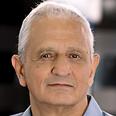
'All one needs is a deep pocket to hide the device in. Luckily, haredi suits have plenty of pockets'
Photo: Reuters
The thing undermining the walls of the haredi ghetto these days is neither the draft law in its Yaakov Peri
version nor the draft law in its Ayelet Shaked
version. The ghetto's enemy is a gadget made of plastic and metal, 12-13 centimeters long, 6-7 centimeters wide, which is as thick as a little finger and weighs 100-150 grams. It's called a smartphone.
Every self-respecting yeshiva student purchases two devices – a kosher one, for the supervisor, and a regular one, for real life. The devil wears pixels.
When, in retrospect, it will be possible to get a better assessment of the extent of the change the haredi society is undergoing, a debate will be launched over the credit: Was it the High Court which created the change or Yair Lapid;
does Plesner
deserve the fame or the world war between the followers of Rabbi Shteinman
and the followers of Rabbi Auerbach?
I hope that that in this opportunity they will not forget the part played by Moshe Kahlon,
as during his term as communications minister cellular phones became affordable for everyone, including the haredi soul.
Former haredim are the only ones who can testify about the magnitude of this wonder. For young people who were raised in a closed, detached world, devoted to the authority of 100-year-old people, it opens a window to a different, wild, magical world; whoever peers at it once will find it difficult to avoid a second, third and fourth time. One does not need an antenna exposing the sin in public; one does not need a dish on the roof. All one needs is a deep pocket to hide the device in. Luckily, the haredi suits have plenty of pockets.
Haredi Enlistment
Eitan Haber
Op-ed: Government needs to start offering the ultra-religious the carrot more, not the stick. Let them work so they'll get out of their close-knit environment of rabbis and political figures
A bitter battle is being waged these days between Yesh Atid and Habayit Hayehudi. A ministerial committee headed by Yaakov Peri (Yesh Atid) formulated the bill; a parliamentary committee headed by Ayelet Shaked (Habayit Hayehudi) is supposed to prepare it for its second and third readings. Peri determined that if the haredim fail to meet the quotas they will be considered defectors; Shaked wants to replace the criminal sanction with fines.
The two tracks are problematic from an ethical point of view. Peri's track threatens to turn serving the state into a punishment. No one wants to see police vans headed to Bnei Brak. Shaked's track exchanges service with money. That doesn't match the value of service either. The IDF is against it. As clarified by the Military Advocate General's representative in the committee, Lieutenant Colonel Inbal de Paz, the moment a decision is made about fines, a secular citizen (or, to be accurate, a secular publicity-seeking lawyer) will petition the High Court of Justice, claiming that his son also deserves to be exempt from military service in exchange for money. The High Court will be forced to annul the law. The other pecuniary punishments embedded into Shaked's proposal have either already been imposed or are baseless.
At the current stage, more than the law has to do with the haredim, it has to do with Lapid and Bennett, with their "principles," with their list of priorities, with their public status. Lapid, who is publicly battered, cannot afford a failure; Bennett depends on rabbis, some of whom identify with the haredim and others who make a living off hesder yeshivot. Yesh Atid members are threatening Shaked that if she continues working to diminish the law, they will harm the outrageous exemption received by hesder soldiers. The severity of these remarks points to the two brothers' return to their bases: Lapid to secularity, Bennett to the synagogue.
The Likud is watching this battle from aside. Defense Minister Ya'alon seeks to use the law to extend the girls' service in the IDF and compare it to boys' service. Committee member Elazar Stern (Hatnua) says that this demand is unfounded – it's unnecessary and it won't happen. As for the haredim, Ya'alon wants the law to give him maximum maneuvering area: He will decide how many to draft, when and how. I doubt the Knesset members will give him this power.
It won't hurt to remember what started this whole thing: The need to bring the haredim into the labor market. The IDF draft was aimed as a means, not as an end. This law will not be tested by the number of recruits, but by its contribution to the economy and society. IDF or iPhone, national service or Samsung, the important thing is that the walls will fall. This law's job, with all its problematic characters, is to speed up this process.
















